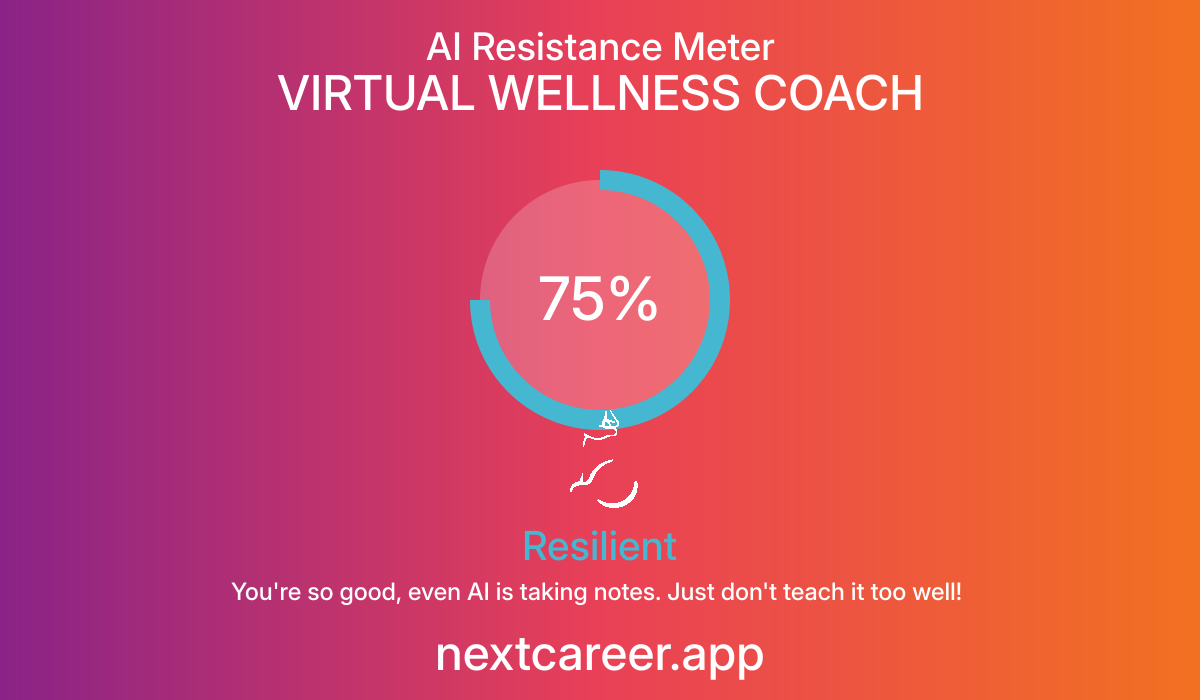AI Resistance Analysis
VIRTUAL WELLNESS COACH
VIRTUAL WELLNESS COACH
AI Resistance Score
AI Resistance Meter
Resilient
VIRTUAL WELLNESS COACH
You're so good, even AI is taking notes. Just don't teach it too well!
As a Virtual Wellness Coach, the role blends cognitive tasks, emotional intelligence, and creative thinking, making it moderately resistant to AI. While aspects of the coaching process can certainly be automated—such as providing personalized fitness plans or nutritional advice through AI algorithms—it is the human connection and emotional support that play crucial roles in effective coaching, which current AI lacks. Over the near term, AI tools will assist coaches, but the need for a human touch remains significant in fostering motivation and accountability.
As a Virtual Wellness Coach, the role blends cognitive tasks, emotional intelligence, and creative thinking, making it moderately resistant to AI. While aspects of the coaching process can certainly be automated—such as providing personalized fitness plans or nutritional advice through AI algorithms—it is the human connection and emotional support that play crucial roles in effective coaching, which current AI lacks. Over the near term, AI tools will assist coaches, but the need for a human touch remains significant in fostering motivation and accountability.
Key Factors
- Cognitive Tasks: While AI can analyze data and generate personalized plans, the value of nuanced understanding and adaptability in coaching is not fully replicable by AI.
- Emotional Intelligence: AI struggles to replicate human empathy and emotional connection, essential for building trust and rapport with clients.
- Physical Skills: Coaches may use AI and virtual reality tools to enhance physical training, yet physical demonstration and real-time feedback from a human lacks viable replacement.
- Creative Thinking: Creating individualized coaching strategies requires creativity, which is a stronghold of human professionals as opposed to algorithmic solutions.
Human Advantages
- Empathy and emotional support are irreplaceable in the coaching relationship.
- The ability to interpret complex human behaviors and motivations is beyond current AI capabilities.
- Personalized interactions and adjustments based on real-time feedback enhance effectiveness.
AI Vulnerabilities
- Standardized advice may be easily replicated by AI systems.
- Basic motivational techniques can be codified into AI applications.
Recommended Actions
- Develop robust emotional intelligence and active listening skills to enhance client relationships.
- Stay updated on AI tools and technologies to integrate them into coaching practices for efficiency.
- Create niche specialties within wellness coaching (e.g., trauma-informed coaching, alternative wellness) that leverage human insight.
- Engage in continuous learning and professional development to adapt to the changing landscape of wellness and coaching.
In the near term (5 years), we will see an increase in AI-assisted wellness tools, providing coaches with valuable data insights. However, the role of the coach as a human guide and motivator will remain essential. In the long term (20+ years), while AI may take on more of the data-driven aspects of wellness coaching, the demand for human coaches will persist due to the need for emotional intelligence and personalized human connections. Instead of replacing jobs, AI will likely augment them, making wellness coaches more effective and versatile.

Why Calculate AI Resistance?
Understanding how AI-resistant your career is becoming increasingly important in today's rapidly evolving job market. Our analysis combines multiple factors including required human skills, technological adaptability, and future industry projections to give you a comprehensive view of your career's sustainability.